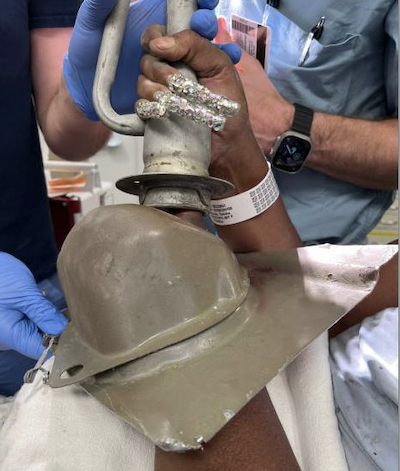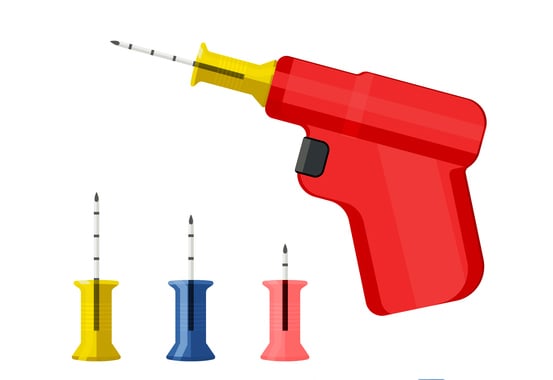Program Director Interview Series: Danielle Turner-Lawrence, MD | William Beaumont University Hospital – Corewell Health
Program Director Interview Series: Danielle Turner-Lawrence, MD | William Beaumont University Hospital – Corewell Health
Luke Alley, MSc, OMS-III
Kentucky College of Osteopathic Medicine
EMRA MSC Midwest Coordinator
Danielle Turner-Lawrence, MD Is the program director of Emergency Medicine at William Beaumont University Hospital – Corewell Health in Royal Oak, Michigan. She is also an Associate Professor and Associate Dean for Graduate Medical Education for Oakland University William Beaumont School of Medicine. She shares some of the unique features and opportunities at her residency program.
- What sets your program apart from others; what is something unique that students may not know about your program?
The Corewell Health William Beaumont Emergency Medicine Residency offers a unique hybrid of academic and community training, exposing residents to a diverse and high-acuity patient population. As one of the busiest emergency departments in the country, the ED saw over 130,000 visits in 2024, including 28,000 pediatric encounters. Renovated and expanded in 2019, the department features modern, state-of-the-art facilities and bedside diagnostic capabilities.
The program fosters a strong sense of camaraderie and prioritizes resident wellness. Our faculty includes more than 40 board-certified emergency physicians, with over one-third fellowship-trained or dual-boarded, representing a wide range of subspecialty expertise. We also offer an extensive array of specialty tracks, giving residents the opportunity to develop focused areas of interest, deepen their education, and position themselves for competitive fellowships and job opportunities after residency.
- What made you choose your program; was a 3-year or 4-year length a factor for you when applying?
I chose to attend a 3-year Emergency Medicine residency. For me, it was important to train at a high-volume, hybrid academic and community hospital known for excellence in Emergency Medicine education. The three-year structure gave me the rigorous training I was looking for, with the ability to grow clinically and explore areas of interest without extending the length of training. That same combination of academic excellence, high clinical volume, and a supportive, collegial culture is what I sought after residency—and it’s exactly what drew me to join the faculty at Corewell Health William Beaumont University Hospital.
- What range of USMLE/COMLEX Step 2 scores do you look for in an applicant for your program?
We use a holistic review process for all applications and do not have a specific score cut-off. While our current residents tend to average USMLE Step 2 CK scores in the 245–248 range, we have accepted applicants with a wide variety of scores. Board exams are one of several tools we use to help assess readiness for residency and future success in passing the ABEM certification exam.
- What kinds of opportunities for research exist in your program? Do you look for residency candidates with research experience?
The program features a strong research division that actively supports residents in meeting their scholarly activity requirements and building research skills. While prior research experience is not required, we have matched residents with diverse backgrounds—from those with PhDs or advanced degrees to those with minimal prior exposure. Regardless of your experience level, we offer robust mentorship and a wide array of opportunities to engage in meaningful scholarly work.
- Do you have opportunities to explore/expand into other areas of interest in EM, ex. CC, EMS, Wilderness, etc.?
Absolutely. In addition to extensive clinical exposure—including seven months of dedicated critical care experience during the PGY1 and PGY2 years and a unique Research and Resuscitation rotation—we offer formal specialty tracks that begin in the PGY2 year. These include Critical Care, Research, Geriatric EM, Pediatric EM, Health Policy, Medical Education, and EMS/Disaster Medicine. Each track provides structured opportunities to deepen your knowledge, attend a national conference in your chosen area, and build your network through internal and external mentorship.
- What are some qualities that your program looks for in applicants?
We are looking for applicants who are passionate about Emergency Medicine and excited to become part of a tight-knit, collaborative community of residents and faculty. Strong academic performance, solid clinical skills, and excellent interpersonal abilities are key, along with qualities like adaptability, teamwork, and a commitment to continuous learning and patient-centered care.
- Can you describe any other attributes and qualities that make applicants stand out?
Applicants who bring diverse experiences, have taken on leadership roles, and demonstrate a strong commitment to service and community engagement often stand out. Strong letters of recommendation—especially your eSLOEs—carry significant weight. A compelling personal story and experiences that clearly reflect your dedication to Emergency Medicine can also make a powerful impression.
- How does your program view wellness; how would you describe your program’s culture?
Our program places a strong emphasis on wellness, camaraderie, and community. Residents begin their training with an orientation month that includes team-building activities to foster strong relationships with peers and faculty. We hold dedicated retreats during each year of training to support reflection, connection, and personal growth. Our "We-See-You" initiative assists during times of personal or professional need, reinforcing that you're never alone. Above all, we have a caring faculty who are deeply invested not only in your education, but also in you as a person. Our culture is one of support, respect, and genuine connection.
- Is your program a community based or academic based program? What is the advantage of your program’s setting?
Our program offers a hybrid academic-community experience—the best of both worlds. Based at Corewell Health William Beaumont University Hospital, we combine the academic rigor and resources of a major teaching hospital affiliated with Oakland University William Beaumont School of Medicine with the hands-on, high-volume clinical exposure of a large community hospital.
Residents rotate at Corewell Health Beaumont Troy Hospital during each year of training. CH Beaumont Troy Hospital is a busy community hospital with only a Family Medicine residency, providing a unique opportunity for increased autonomy and exposure to a wide variety of pathology. In the PGY-3 year, residents also complete a dedicated community rotation at a free-standing ED and smaller community site with no residency programs.
These varied settings offer exposure to diverse patient populations and practice styles. In addition, residents have two electives per year and often use these to explore different clinical environments, helping them build a broad, adaptable skill set for future practice.
Related Content

Mar 23, 2025
Severe Finger Entrapment in Gas Filler Cap Valve of 2003 Ford Expedition
How do you manage a case of a patient's finger stuck so completely in a Ford Explorer gas valve that EMS arrives with part of the vehicle attached to your patient? Hint: Consider the use of a nasopharyngeal tube, an angle grinder, and DoorDash.

Nov 02, 2022
Critical Care Alert: A Randomized Trial of Drug Route in Out-of-Hospital Cardiac Arrest
Every minute counts for long-term outcomes in out-of-hospital cardiac arrest. Does the route of administration for lifesaving medications play a role? This EMRA Critical Care Alert dives into the PARAMEDIC-3 trial, comparing outcomes in OHCA patients who were treated with intraosseous access versus intravenous access.





